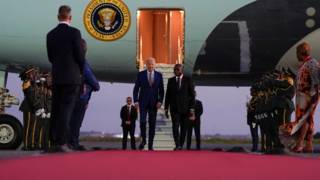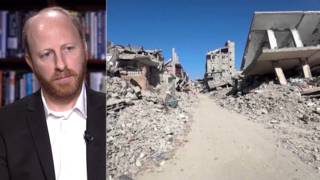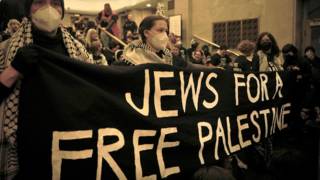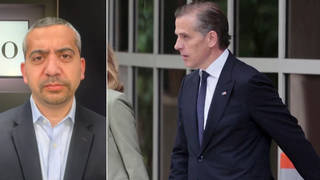
Related
Topics
Guests
- Osama Nassaractivist in East Ghouta, a suburb of Damascus, in an area controlled by opposition forces.
- Yasser MunifSyrian scholar at Emerson College who specializes in grassroots movements in Syria. He has made several trips there, most recently in 2015, when he visited the Syrian-Turkish border. He is a sociology professor at Emerson College and a co-founder of the Campaign for Global Solidarity with the Syrian Revolution.
The Obama administration is threatening to cut off diplomatic talks with Russia on Syria in the wake of a devastating bombing campaign by the Syrian government and Russia in the city of Aleppo. On Wednesday, the two largest hospitals in East Aleppo were forced to close after being hit by airstrikes. The Russian-backed bombing of Aleppo intensified after a ceasefire collapsed 10 days ago. U.N. Secretary-General Ban Ki-moon says that the situation in the Syrian city of Aleppo has become worse than a slaughterhouse. We speak to Syrian activist Osama Nassar in East Ghouta, a suburb of Damascus, and Yasser Munif, a Syrian scholar at Emerson College who specializes in grassroots movements in Syria.
Transcript
NERMEEN SHAIKH: The Obama administration is threatening to cut off diplomatic talks with Russia on Syria in the wake of a devastating bombing campaign by the Syrian government and Russia in the city of Aleppo. On Wednesday, the two largest hospitals in East Aleppo were forced to close after being hit by airstrikes. There are reportedly only about 30 doctors left in East Aleppo, where 250,000 people are currently trapped. The Russian-backed bombing of Aleppo intensified after a ceasefire collapsed 10 days ago. Witnesses have described it as the worst assault in the five-year civil war. U.N. Secretary-General Ban Ki-moon says that the situation in the Syrian city of Aleppo has become worse than a slaughterhouse.
SECRETARY-GENERAL BAN KI-MOON: This morning, we awoke to reports of strikes on two more hospitals in Aleppo. Let us be clear: Those using ever more destructive weapons know exactly what they are doing. They know they are committing war crimes. Imagine the destruction, people with their limbs blown—blown off, children in a terrible pain with no relief, infected, suffering, dying, with nowhere to go and no end in sight. Imagine a slaughterhouse. This is worse. Even a slaughterhouse is more humane. Hospitals, clinics, ambulances and medical staff in Aleppo are under attack around the clock. According to Physicians for Human Rights, 95 percent of medical personnel who were in Aleppo before the war have fled, been detained or killed. This is a war against Syria’s health workers.
AMY GOODMAN: Video footage from Aleppo has emerged showing Syrian Civil Defense forces digging a young girl out from under the rubble. Five-year-old Ghazal Qasim was reportedly the sole survivor from an airstrike that killed 24 people in the Aleppo neighborhood al-Shaar. Her entire family, including four siblings, were reportedly killed in the bombing. According to aid groups, children in Aleppo have made up a large proportion of the casualties from the bombings. At least 100,000 children remain trapped in the eastern part of Aleppo.
Meanwhile, Human Rights Watch has accused Syrian government forces of using toxic chemicals in two recent attacks in Aleppo that killed five civilians and injured dozens. The group also said new information has emerged indicating the self-proclaimed Islamic State, or Daesh, has recently used chemicals as a weapon inside Syria.
On Wednesday, President Obama addressed the crisis in Syria during a town hall meeting on CNN.
PRESIDENT BARACK OBAMA: The key in Syria at this point is, unless we can get the parties involved to recognize that they are just burning their country to the ground, and get it on a diplomatic and political track, frankly, there’s going to be a limit to what we can do. We will try to mitigate the pain and suffering that those folks are undergoing. This is part of the reason why our approach to refugees, for example, has to be open-hearted—although also hardheaded to protect our homeland. But at the end of the day, there are going to be challenges around the world that happen that don’t directly touch on our security, where we need to help, we need to help lead, but just sending in more troops is not going to be the answer.
AMY GOODMAN: To talk more about Syria, we’re joined by Osama Nassar, an activist in East Ghouta, a suburb of Damascus, an area controlled by the opposition forces. Can you tell us what’s happening on the ground right now, Osama?
OSAMA NASSAR: Good morning. Actually, you know that all the cameras and all the media is now fixing on Aleppo, this city that are being attacked by the Russian airstrikes and the regime, the Syrian regime forces, and that maybe the American people and all—maybe most the West know nothing about our cause. They only know that there is, you know, ISIS, and there is people who are fighting for some reason or for no reason. You know that the regime has blacked out all the independent media in here, and he is only the only media who are allowed to go there and there.
Actually, people are really upset about what Mr. Obama said, what Mr. Obama does, actually, every now and then. The U.S. administration did nothing for to stop this ongoing slaughter in Syria. And it became really complicated, year after year, and even day after day. You know that a couple of—you know, today is the first anniversary of the Russian intervention in Syria. So, this means that one year ago, if the U.S. did something about Syria, they had nothing to—I mean, they were not obliged to do these marathon negotiations with the Russians. Two years ago, there were no, for example, bombing in the European country and in other places rather than Syria and Iraq. Three years ago, there were even no ISIS. Four years ago, there was no—there was no Jabhat al-Nusra. Five years ago, there were only people who are seeking freedom and dignity and demonstrating very peacefully in the street. So the more you delay or the more the U.S. and the international community are late to do something to stop this ongoing massacre in Syria, the more it’s become—
AMY GOODMAN: I’d like to bring Yasser Munif into the conversation, a professor at Emerson College who specializes in grassroots movements in Syria. He’s made several trips there, most recently in 2015, when he visited the Syrian-Turkish border. He’s a sociology professor at Emerson College. Yasser, could you talk about why you think the recent ceasefire between—that was negotiated between the U.S. and Russia in Syria collapsed?
YASSER MUNIF: Thank you for having me.
I think the main reason for the collapse of the ceasefire is, initially, the deal between the U.S. and Russia was not political. It was really only focusing on the military aspect of the conflict. And for the Russians, what was essential and important was basically maintaining the Syrian regime and making sure that the boundaries between the jihadist groups and the moderate military groups are blurred, and pushing most of the moderate groups into an alliance with al-Qaeda and other jihadist groups. For the—for the U.S., the goal of that deal was basically to collaborate and coordinate the strikes against ISIS. And in the end, the Syrian opposition or the Syrian population didn’t get anything, and the deal was basically offering to the Russian that they could maintain the Syrian despot.
So, there was total refusal and rejection of the deal by the Syrian population for obvious reasons, and it was basically reducing their revolution into a humanitarian conflict that would basically lead to opening a few corridors here and there and that some of the aid would reach the besieged areas in Aleppo and so on. But in the end, it was really benefiting the Syrian regime, not any of the opposition. And despite that—
NERMEEN SHAIKH: Well, I want to turn—Yasser, I want to turn to comments made by the U.N. special envoy for Syria, Staffan de Mistura. In an interview with Al Jazeera’s Mehdi Hasan on Saturday, he explained why he thought the recent ceasefire collapsed.
STAFFAN DE MISTURA: Who do you think would not agree, would not agree with the fact that the Syrian air force needs to be grounded? Well, obviously, President Assad is clearly not happy about it; otherwise, he would have been not able to do what he’s been claiming publicly to do, in Darayya and elsewhere, to reconquer the whole Syria territory. And to do so, he needs the air force.
On the other side, put yourself in the place of the armed opposition and their sponsors. Do they really find it easy for them, or do they like the idea of disconnecting from al-Nusra, which, in their view, has been one of the biggest fighters against Assad, but at the same time everybody recognizes, including U.N., is al-Qaeda, regardless whether they change their name? Then you would have an answer: who has no, at the moment, keen interest in making the deal working.
NERMEEN SHAIKH: Yasser Munif, can you comment on what the U.N. envoy for Syria said, and in particular the point he makes about Jabhat al-Nusra and their working with opposition forces in Syria?
YASSER MUNIF: [inaudible] the level and the scale of the violence against the Syrian population in Syria is basically due—it’s because of the monumental resilience and resistance of the Syrian population. We have to remember that the Syrian revolution has been going for five years, and it has many, many enemies, including the U.S. and Russia and Iran and Hezbollah and Turkey and Saudi Arabia and so on and so forth. And all these different forces, for different reasons, are trying to crush the Syrian revolution. The Syrian regime has been, since the beginning, trying to crush the secular and the progressive dimension of the revolution, and pushed the jihadists and empowered them and released them from prison, and they have become what they are today. And the Russian also are trying to basically break that kind of difference or differentiation between the moderate and the secular, to a certain extent, and the jihadist groups. And by using that type of violence and massacring the population, slaughtering people in Aleppo, it’s pushing the moderate groups and al-Qaeda to basically form an alliance, and, as such, pushing the West to basically choose the lesser evil, and that lesser evil being the Syrian regime as opposed to al-Qaeda and ISIS.
And even the U.N. played a very detrimental role in the Syrian conflict. I mean, the reports that show how the U.N. has been helping and dropping aid to the besieged city of Deir ez-Zor, which is under the control of the Syrian regime, but never dropping aid to any of the areas controlled by the opposition, or some of the funding that reached the Syrian military that was sent by the U.N. and so on. So the role of the U.N. is really detrimental. De Mistura is basically and clearly biased toward the Syrian regime.
AMY GOODMAN: I wanted to ask you about a comment that Syrian President Bashar al-Assad said in an interview last week on AP, the Syrian president denying government forces are besieging the rebel-held areas of Aleppo.
PRESIDENT BASHAR AL-ASSAD: If there’s really besiege—or siege around the city of Aleppo, people would have been dead by now. This is the second—more importantly, they have been shelling the neighboring areas and the position of the Syrian army for years, nonstop, nonstop shelling of mortars and different kind of little bombs. How could they be starving while at the same time they can have armament? How can we prevent the foods and the medical aid from reaching that area, and we cannot stop the armament from reaching that area? …
They accuse Syria of attacking hospitals. So you have hospitals, and you have doctors, and you have everything. How could you have them? How could you have armament? That’s the question. How can you get armament to your people, if you claim that you have people in the grassroots, while you don’t have food? They have to explain. I don’t have to explain. The reality is telling.
AMY GOODMAN: That’s the Syrian president, Bashar al-Assad. Yasser Munif, can you respond?
YASSER MUNIF: So, the Syrian regime, very early, understood the importance of the media and creating a discourse, in addition to what’s happening on the ground, the military aspect of the conflict. And it was able, unfortunately, to create a parallel reality and create a media apparatus and information, propaganda, that is relayed by a number of different network, including RT, the Russian TV, but also a number of different websites and news outlets here in the U.S.—for example, Mint media and CounterPunch and others, who are basically repeating such silly things. I mean, anyone can verify and see that there is a siege around Aleppo. It’s not very difficult to do. If journalists wanted really to talk to people on the ground and interview them and get their views, it would be very easy. But the Syrian regime basically understands that and is using the media and that type of discourse as a weapon against the revolution, basically trying to confuse the different audiences and telling them that there are different truths, there are biases, we’re not sure—basically, creating confusion and challenging what’s happening on the ground.
NERMEEN SHAIKH: Well, today, The Intercept obtained—yesterday, obtained internal U.N. emails that revealed also that U.S. and European sanctions are having an extremely detrimental effect on ordinary Syrians and making access to aid supplies more difficult. Yasser Munif, could you respond to that?
YASSER MUNIF: Sure. I mean, this is also another aspect. The Syrian regime is using all weapons that are available for it to use, including besieging entire areas, starving the population, using bunker-busters bombs with the aid of the Russian, torturing the population, preventing water from reaching certain areas, and so on and so forth. And, unfortunately, I mean, the sanctions, as we know from previous experience with Iraq and so on, affect, for the most part, the civilian population. And that’s another example of how the Syrian population is basically surrounded and besieged in so many different ways.
I also wanted to mention that, as your previous guest mentioned earlier, that today we are witnessing or celebrating the first anniversary of the Russian intervention. And we are organizing a number of revolts in more than 30 different cities around the world on October 1st to basically raise awareness and tell people what’s happening. There will be revolts, protests, rallies, sit-ins, to basically try to break the siege around the Syrian revolution and tell people that the narrative that they’re hearing about the civilian war and the intervention and so on are a part what is happening. The other part is the resilience of the Syrian population, its resistance, and the ongoing Syrian revolution with its creative dimension and what people are doing within different—in many a different ways.
AMY GOODMAN: Yasser Munif, we want to thank you for being with us, Syrian scholar, professor at Emerson College in Boston, and Osama Nassar, speaking to us from East Ghouta, Syria. We’re going to continue this conversation and post it online at democracynow.org.











Media Options